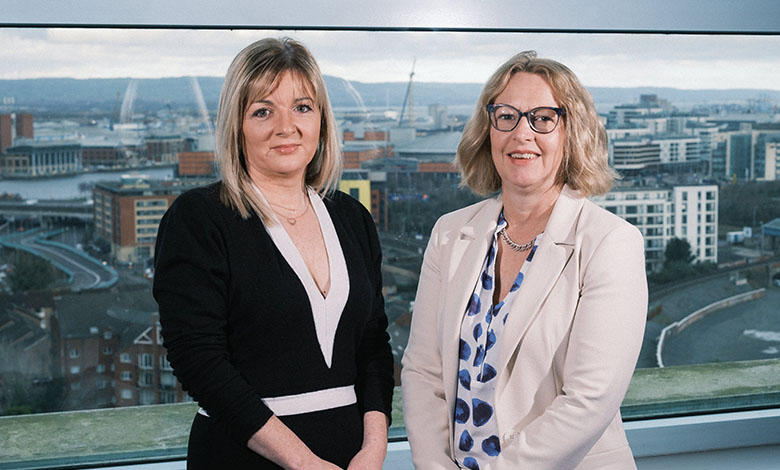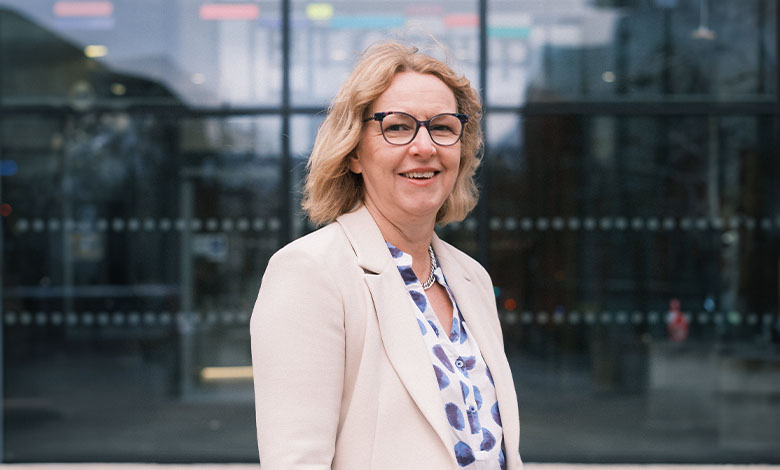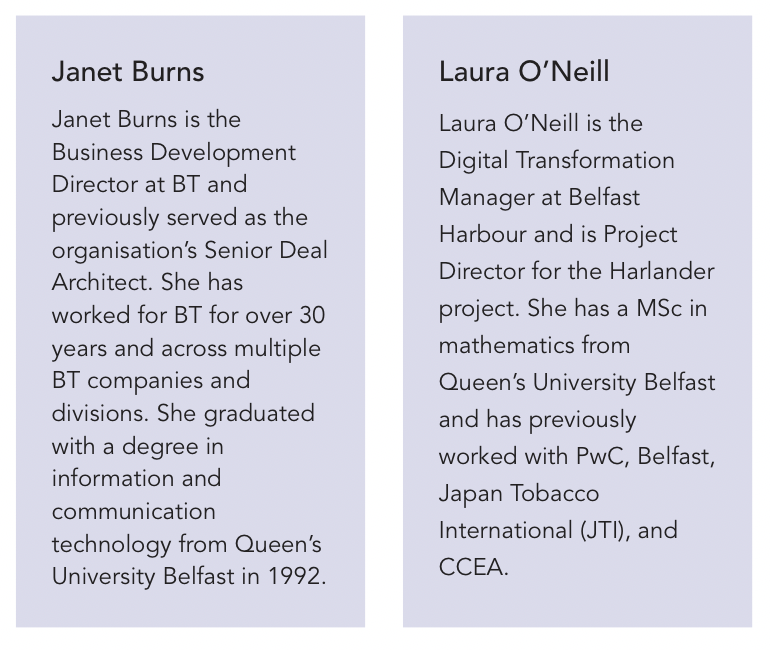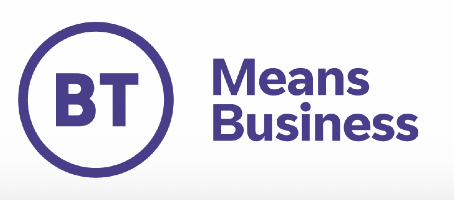Digital approach: A smart approach

Business Development Director at BT, Janet Burns and Digital Transformation Manager at Belfast Harbour, Laura O’Neill talk to David Whelan about the latest technological advancements and innovations that are driving the digital transformation of Belfast Harbour and BT’s Smart Port.
With origins dating back to 2017, the partnership between BT and Belfast Harbour has gone from strength to strength and includes their successful UK-first trial of 5G technology in 2019.
At the time, the driving force behind the partnership was the promotion of innovative collaboration to drive digital transformation. This involved the creation of a sophisticated digital ecosystem comprised of 5G as well as other emerging technologies such as AI, IoT, and connected vehicles.
As BT’s Janet Burns articulates, the partnership recognised the potential for businesses to work together and not only drive positive change for the region as a whole, but also drive industry forward in their ambitions.
The creation and eventual signing of the Belfast Region City Deal in December 2021 served as a further catalyst for even greater collaboration and further success.
A global company with a local focus, BT Group, which includes EE, BT Business, and Openreach, has a long-standing legacy of providing connectivity solutions for both public and private sector organisations in Northern Ireland. Digital evolution has mandated the organisation to successfully transition from a telco to a techco. This is underpinned by their record investment in next generation networks such as full fibre broadband via Openreach, where Northern Ireland is now the most digitally connected region in the UK as well as the business’s investment in developing 5G solutions via its mobile network EE.

“Together, we have implemented or piloted some of the solutions and technologies that will shape the future of port industry.”
Laura O’Neill of Belfast Harbour explains that while maybe not immediately recognisable, a synergy exists between BT’s solutions-led connectivity programme and the ambitions of Belfast Harbour to create a world leading regional port.
Home to a diverse range of over 760 businesses across a 2,000-acre land estate, the strategic plan entitled A Vision to 2035: A Port for Everyone encompasses three core themes of developing a world leading regional port; a key economic hub; an iconic waterfront for the city enabled by a focus on being a green and a smart port.
O’Neill explains that with connectivity serving as a key enabler of a smart port, BT stood as the perfect partner for future innovation.
“Belfast Harbour being a regional port could utilise our size and proximity to the city to be a leader and exemplar of innovative programmes and technology,” explains O’Neill.
“BT not only offered us the connectivity we were looking for but saw the potential for the port to serve as a testbed for technologies which, if successful, could then be scaled up and rolled out across the region.”
5G network
In 2020, BT and Belfast Harbour announced plans to build a state-of-the-art 5G ecosystem within the port, enabling a series of 5G-led innovations to help accelerate Belfast Harbour’s digital transformation. A UK and Ireland-first, 5G private network was designed specifically to achieve the highest levels of ultrafast mobile connectivity across the port’s main operational areas.
Burns says: “At BT, we are proud to partner with Belfast Harbour on a range of exciting and innovative projects that showcase how the port can harness the power of technology to enhance its operations, security, and sustainability.
“Together, we have implemented or piloted some of the solutions and technologies that will shape the future of the port industry.”
The provision of a 5G private network across the operational port enables the transfer of high-volumes of data remote control of devices and machinery, and real-time analytics, O’Neill says, has been critical to further enhancing productivity and performance.
The solutions and technologies enabled by the network help the port to handle increasing demands, improve safety and security, and prepare for the challenges and opportunities of the future, and, as Burns explains, also “demonstrate how BT and Belfast Harbour are leading the way in transforming the port industry and creating a smart and sustainable port for the 21st century”.

Following creation of the 5G private network, the collaboration also extended to the creation of a 5G private network for tenants of Belfast Harbour. With Belfast Harbour serving as an anchor project for grant funding from the UK Department for Science, Innovation and Technology, as part of the Belfast Region City Deal 5G innovation regions project, aimed at accelerating advanced wireless adoption in Northern Ireland, the project created a use case in port operations for businesses along West Bank Road in Belfast.
Quizzed on the benefits for BT in such a project, Burns explains: “By supporting Belfast Harbour to be the first port in the UK with a 5G private network we had the opportunity to not only improve connectivity of Belfast Harbour and their tenants but to also use this unique area to showcase the value of 5G connectivity to businesses on a broader scale.
“As a large organisation, BT were looking at our own role in the creation of smart place and smart cities, and the creation of that digital fabric to ensure that digitally enabled innovation and transformation was available to all.
“Belfast Harbour presents a unique opportunity to test and showcase network-enabled technologies that can and will be scaled up, for example, around air quality monitoring and mobility monitoring, which can not only benefit the port and its tenants and customers, but also provide proof of concept for wider usage.
“The port is an innovation showcase for all smart place projects in Northern Ireland, supporting Belfast Harbour, wider city, and Northern Ireland business in achieving its green recovery, operational efficiencies, an increase in productivity, and sustainable ambitions.”
Committed to delivering an ambitious long-term plan to maximise the Belfast Region City Deal, Belfast Harbour is central to the City’s Innovation District ambition and both Belfast Harbour and BT fed into a study highlighting where strategic decisions could be made on infrastructure, which in turn would enable the adoption of technology on a wider basis, with the partnership piloting many of these innovations within the port.
Supporting this idea, O’Neill highlights just some of the technologies that have emerged as a result of the partnership in recent years include the installation of Internet of Things sensors across the port and Queen’s Island area to collect and transmit information of various aspects of the port’s environment ranging from noise pollution and water quality through to weather conditions. The real-time presence of this data on a digital dashboard enables insights and alerts on how the port can optimise its operations and identify and manage any potential issues before they escalate.
Harlander
While all of these technologies have wider use cases, the potential jewel in the crown, however, is their current ongoing work to deliver Northern Ireland’s first autonomous transport system in the form of the Harlander project.
Recognised as the UK’s first 5G-enabled self-driving electric vehicle, the passenger shuttle service, which is expected to be operational in 2025, will provide “last mile connectivity” in the Harbour Estate from Titanic Halt railway station to Thompson Dock in Queen’s Island.
Belfast Harbour is leading the development of the service alongside a consortium of partners including BT, Oxa, eVersum, Angoka, and Horiba Mira following the award of £5.5 million in funding from Innovate UK.
“BT and Belfast Harbour are leading the way in transforming the port industry and creating a smart and sustainable port for the 21st century.”
O’Neill says that the project is a prime example of how Belfast does not always need to be behind the curve in a UK context and can instead serve as a leader.
“This project showcase’s Belfast’s ability to innovate but it also highlights our openness to innovation and the culture that exists here in the region. In the past, this area was recognised for innovations such as the Titanic and the DeLorean, and that culture has not left. There is a great opportunity to put ourselves on the map and show that we are open and willing to lead on groundbreaking innovation.”
Burns adds: “This project is groundbreaking, and it is important to say that it was made possible by those early connections and our ongoing partnership. BT has a huge role to play in the development of future mobility and transport well into the future. What we are doing in Belfast now, alongside Belfast Harbour, showcases our ability to enable these future technologies and innovations which will become a major part of our lives, and all of those involved are pioneers in that regard.
“What the Harlander project presents is, not just the ability to put an autonomous vehicle on the road, but to showcase a whole connected ecosystem ranging from managing cybersecurity through to mobility patterns. The potential exists to demonstrate the operation, learn from the system, and potentially create something that is viable for future transport operators to utilise.
“The pilot feeds into our core purpose of ‘connecting for good’, and not only using our talent, expertise, and leading technology solutions to benefit our customers and communities but presents a massive opportunity to pioneer new technology which could significantly enhance our economy and create jobs.”
The port itself serves as a micro-environment, encouraging businesses to use the surrounding infrastructure to drive their own innovations. Interestingly, the wider impact is already being felt with Northern Ireland’s further education institutions involved in building upon the success of the relationship so far to develop and test future innovative solutions, which when proven, can then be adopted on a wider scale. That relationship ensures that both BT and Belfast Harbour have a role to play in helping to advise on the skills pipeline needed for a future labour market.
Concluding on how the relationship can help develop the region of Northern Ireland for the future, Belfast Harbour’s O’Neill says: “In the delivery of a smart port, we see innovations across our land, sea, and air assets. The ports of the future will look very different from the ports of the past and part of our ambition is to ensure that those businesses that interact with the port can utilise and benefit from that progress and grasp the digital industrial revolution that is taking place.”

BT
T: 028 9021 6161
W: www.bt.com/northernireland

Belfast Harbour
T: +44 (0)28 9055 4422
E: info@belfast-harbour.co.uk
W: www.belfast-harbour.co.uk





